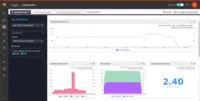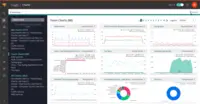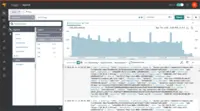Overview
What is SolarWinds Loggly?
Loggly is a cloud-based log management service provider. It does not require the use of proprietary software agents to collect log data. The service uses open source technologies, including ElasticSearch, Apache Lucene 4 and Apache Kafka.
Loggly is Omniscient!
Solid and cost effective
SolarWinds Loggly Gives You the Insight You Didn't Know You Needed
I'm very happy with SolarWinds Loggly!
Centralized data for post mortem to detect the next calamity before it happens
Thank to Loggly, "LOGS" is no longer a dreaded four-letter word.
Loggly has been great value for the price
Great product but not for us
The Best Log You Want in your Eye!
Very powerful logging system
A real centralized solution for you application monitoring
Loggly rocks
Useful, stable service with some possible areas for improvement
Loggly is a great all-in-one-place tool to manage your logs!
SolarWinds Loggly Review by a Mid-Level DevOps Engineer
Awards
Products that are considered exceptional by their customers based on a variety of criteria win TrustRadius awards. Learn more about the types of TrustRadius awards to make the best purchase decision. More about TrustRadius Awards
Pricing
Standard
$79
Pro
$159
Enterprise
$279
Entry-level set up fee?
- No setup fee
Offerings
- Free Trial
- Free/Freemium Version
- Premium Consulting/Integration Services
Product Details
- About
- Integrations
- Competitors
- Tech Details
- FAQs
What is SolarWinds Loggly?
With environments spanning on-premises, hybrid, and public cloud environments, IT operations and application teams are inundated with unrelated events, issues, and logs. Every outage or slowdown directly impacts the business, either in lost productivity or lost revenue. Issues must be diagnosed rapidly and resolved across all the dynamically changing components underpinning your heterogeneous web applications, services, and infrastructure.
SolarWinds® Loggly® is presented by the vendor as a cost-effective, hosted, and scalable full-stack, multi-source log management solution combining powerful search and analytics with comprehensive alerting, dashboarding, and reporting to proactively identify problems and significantly reduce Mean Time to Repair (MTTR).
SolarWinds Loggly Features
- Supported: Highly responsive search at scale
- Supported: Interactive shareable dashboards
- Supported: Anomaly detection and alerts
- Supported: Dynamic Field Explorer™
- Supported: Rapidly pinpoint bottlenecks and failure points
- Supported: Collaborate with all stakeholders
- Supported: New shared agent that collects metrics and logs
- Supported: Add trace context to your logs
SolarWinds Loggly Screenshots
SolarWinds Loggly Integrations
- Mirantis Kubernetes Engine
- Node.js
- Linux
- Amazon S3
- Python
- NGiX
- Apache
SolarWinds Loggly Competitors
SolarWinds Loggly Technical Details
| Deployment Types | Software as a Service (SaaS), Cloud, or Web-Based |
|---|---|
| Operating Systems | Unspecified |
| Mobile Application | No |
| Supported Countries | All |
| Supported Languages | English, Spanish |
Frequently Asked Questions
SolarWinds Loggly Customer Size Distribution
| Consumers | 0% |
|---|---|
| Small Businesses (1-50 employees) | 25% |
| Mid-Size Companies (51-500 employees) | 50% |
| Enterprises (more than 500 employees) | 25% |
Comparisons
Compare with
Reviews and Ratings
(79)Community Insights
- Business Problems Solved
- Pros
- Cons
- Recommendations
Loggly has proven to be an invaluable tool for a wide range of use cases, allowing users to effectively troubleshoot and prevent issues. With its syslog digest capabilities, users can sift through logs to identify the root cause of outages and errors, creating alerts for future prevention. By serving as an aggregation point for streaming logs from network access switches and core routers, Loggly efficiently manages large volumes of data. This makes it a valuable tool for support and engineering teams, providing alerting, monitoring, and issue triage solutions. Additionally, Loggly acts as a central repository for logs from PHP-based apps and servers, offering reports, analysis, and aggregation from different sources. Its flexibility extends to monitoring and debugging large-scale application platforms leveraging multiple microservices. By providing detailed information across different environments, Loggly enables efficient issue tracking and resolution. It also aids in meeting auditing requirements by logging network activity and providing proof of network monitoring. Furthermore, Loggly is widely used to troubleshoot systems, gain insights into performance and health, and visualize trends through its dashboard and alarm capabilities. Whether it's monitoring web traffic, capturing logs to identify security threats on internal and external websites, or monitoring integrations between websites and APIs, Loggly proves to be an essential tool in enhancing monitoring capabilities. Its ability to capture the behavior of software applications during development allows for easier investigation and setting up alerts to prevent service disruptions. Loggly is considered a modern platform for log-file analysis due to its compatibility with Linux systems, plaintext config files, utilization of web standards, and open-source friendly nature. Overall, Loggly plays a crucial role in troubleshooting server and application issues by providing effective solutions for resolving problems.
Intuitive and Easy to Use Interface: Users consistently praise Loggly's intuitive and easy-to-use interface, stating that it simplifies tasks and makes them easier to perform. The user-friendly design allows for quick navigation and access to log data, enhancing overall usability.
Highly Effective Alerting System: Many users appreciate the flexibility and effectiveness of Loggly's alerting system, finding it easy to set up alerts for specific events. Notifications can be received through email or Slack, ensuring that users stay informed about critical issues in their applications.
Comprehensive Integration Options: Reviewers value the extensive integration options provided by Loggly, which support a wide range of log sources and platforms. This feature enables users to consolidate logs from different sources into a centralized location for monitoring and analyzing data effectively.
Confusing User Interface: Many users have expressed frustration with Loggly's user interface, stating that it is confusing and difficult to navigate. They find it challenging to perform tasks effectively due to this issue, which negatively impacts their overall experience with the platform.
Cumbersome Query Language: Some users have found Loggly's query language to be cumbersome and unintuitive. They believe that using the query language adds unnecessary complexity to their log analysis process, making it more time-consuming and challenging to extract meaningful insights from their logs.
Difficulty in Sending Logs: Several users have encountered difficulties when trying to send logs to Loggly, particularly depending on the source system they are using and the level of control they have over it. This has caused inconvenience for these users as they face challenges in seamlessly integrating their logs into Loggly for effective analysis and monitoring.
Users commonly recommend considering alternatives and exploring other options in addition to Loggly. They suggest looking into different logging and monitoring solutions before making a decision.
Another common recommendation is to ensure the correct data is inputted and to tweak the data sending process if necessary. Users advise being careful with the data that is being sent to Loggly and making any necessary adjustments to improve the accuracy of the logs.
Integrations and tools are also mentioned as important factors to consider. Users suggest looking into the available integrations and using tools to build the desired structure for log management and analysis.
It is worth noting that some users recommend spending time reducing log noise and standardizing the log entry process. They emphasize the importance of streamlining the logs to avoid unnecessary clutter and confusion.
Additionally, users suggest using Fluentd as an adapter to ensure Loggly receives all the necessary information. They find it helpful for ensuring smooth communication between systems.
Having someone knowledgeable who can provide training on Loggly is also recommended by users. They believe that having assistance from an expert can greatly enhance the user experience.
Organizing requests and their results is another recommendation made by users. They find Loggly useful in this regard, as it helps them keep track of their requests and easily access the corresponding results.
While many users find Loggly to be a good initial solution, some mention that costs can increase as usage grows. It is advised to keep this in mind when considering long-term usage of the platform.
Overall, users describe Loggly as an excellent solution for debug log management and analysis. They appreciate its functionality, especially with the addition of the live-tail client. Some users compare Loggly to LogEntries and note that they find Loggly to have better polish.
Attribute Ratings
Reviews
(26-48 of 48)Loggly: we needed something fast and it worked well.
- Ease of setup
- Intuitive UX
- Response times are fast
- The system seemed to lack the power (AI anomaly detection) of other offerings, but we were only on the free tier.
- No advanced features were evaluated.
Loggly is good
* Aggregating all of our logs.
* Deriving metrics from our logs.
* Sending alerts to our team when those metrics change in some way that matters to us.
- Putting our logs in one place and making them searchable. We use AWS, and CloudWatch has always been a little frustrating in this regard (though it has gotten better recently).
- Deriving metrics from our logs. I think log-based metrics is such a good idea because your logs are the ultimate source for truth in regards to what the hell is going on inside your app. I have really loved the simplicity with which I can just count certain statements and call that a metric because just through the normal course of development certain log statements just naturally become a straightforward recording of an event having occurred.
- Alerts. I actually have a few complaints about email alerts, but just the way I was able to set them up so easily has been huge. Since we started using Loggly, there have been at least 3 bugs that Loggly exposed that were frankly very bad. And withoutt Loggly or without a user reporting them, we would have never known they were happening! This is stuff I tried to set up in CloudWatch in various ways, but because of my own ignorance or perhaps the complexity/limitations of CloudWatch (or the complexity of my stack?), I wasn't getting the information that I needed until I was able to just tell Loggly to send me an email whenever the word "error" showed up.
- I would love the ability to able to suppress a particular "event" instead of an entire alert. For example, sometimes an error is caught and handled but the word "error" is still printed to the logs. It would be nice if I could mark an event as "handled" without suppressing the entire alert for n minutes- if I do that then I would miss a real error that happened in that window. Also if I have my alerts set to run every minute checking the last five minutes, I will get 5 emails. It would be nice if there was some de-duplication. I have actually considered setting up webhooks into some API of my own instead of just emails to do this.
- I find the query language to be a little cumbersome. I suspect this is something you guys inherited from whatever index you use, but things like the __exists__ flag are strange. If I just type something into the field I am often surprised that I have to put quotation marks in (instead of it just searching for the term I supplied without any advanced features).
- Derived fields sometimes frustrate me, especially when I am using regex. I will sometimes create regexes that work in a test bed but do not work in Loggly. It is frustrating that I always have to match the beginning and the end of the string.
- The dashboards can be frustrating, especially when I am just trying to put a single number metric in a chart. I should be able to create a chart with multiple metrics: multiple charts with a single metric in each takes up a ton of space and limits the usability of the dashboard
Use it if your devs can log effectively or you'll end up in a jam when you hit your cap
- It can log whatever a developer decides to add information about.
- Zooming in on a particular time frame is helpful.
- The ability to tag/label events.
- Once the logging limit is exceeded, there are no logs period. Unexpectedly noisy logs often correlate with services misbehaving and potentially leading to disruption. An outage is an awful time to lose visibility into the entire system of apps. Some ways to bridge this gap would be appreciated.
- Filtering by tags is not intuitive in the web interface. You may believe that you are performing the same search and filter as last time since the tags entered are the same, however, this is often not the case. The reliable way to know that you have the same filter is to bookmark the URL. This lack of ease in usability results in devs using Loggly less than they could and implementing logs less effectively during development time (since they don't consider themselves likely to view them anyway).
- Would like to see a way to onboard our less experienced devs to using Loggly effectively.
Loggly's price and ease of deployment compared to many alternatives make it a no-brainer.
- Creating alerts for specific events is very easy.
- Data visualizations are easy to configure; some are baked in.
- The price of Loggly is well below all other cloud logging tools I reviewed.
- Extra pre-baked dashboards would be useful.
- Searching for multiple conditions sometimes fails even when each of the fields can be found individually within a log message.
- Documentation to configure S3 archives needs to be updated to reflect the current Loggly GUI options.
Great tool, love it!
- Simple search.
- Great visualization.
- Easy to use.
- Very practical.
- Maybe examples of advanced filtering.
A great cloud-based managed log aggregation and search solution.
- Visually represent event count via bar graphs.
- Statistical function for graphing medium and 95th percentile performance metrics.
- Fast return of search results.
- Supports log streaming via Fluent.
- The price model for the log ingestion rate is rigid and pushes for a higher usage commitment for companies with variable log generation due to weekly or monthly patterns.
- Does not support long term cold storage as an option for uploaded logs.
- Limited to no integration with other Solarwinds MSP product lines.
Loggly gets the job done, every time.
- Detecting logs messages for alerts
- Log drill-downs through attributes
- Bringing various sources together
- Charts/metrics
- Understanding and adapting to specific formats
- Docker system ingesting
Testing Loggly for a New Centralized Logging Platform
- Centralized logging: having logging for multiples sites (networks) all under one roof was really nice.
- Customer support: the customer support was outstanding when we had issues with our deployment of our first nxlog configuration.
- Ease of use: though there is a small learning curve, once conquered, Loggly becomes a very handy tool when needing to pull up past events or logs.
- nxlog: having to use another piece of software is a bummer
- nxlog configuration: the learning curve for nxlog is monumental and not very intuitive
- 1:1 Alerting: Loggly does not support this which is ultimately why my company is looking elsewhere. The alerting does not mesh well those who want login and logout alerts in real-time
Loggly: Pleasantly surprised!
- Makes viewing logs more readable.
- Allows us to pull logs from different sources.
- Search is good, when you know how to use it.
- Support is not the best, it's only email and they won't get on a remote session with you.
- Bit of a learning curve to get started.
- Had issues with getting CloudWatch logs, had to escalate to a higher support rep.
A startup engineer's review on Loggly
- Quick customer supports. I found an issue and the customer service provided some workarounds before the final fix.
- Easy HTTP integration. I integrated into my own Lambda function so I can process logs with my own logic.
- Speedy (majority of the time).
- Clean UI.
- Cooler Charts/Dashboard.
- More intelligent input prompts.
When I was in my previous company there were teams taking care of the ElasticSearch and Logstash so I only needed to use Kibana. In my current startup, I feel it's easier to use Loggly.
- Quick filtering of data
- Effective and flexible alerting system
- Simple user interface
- The charting feature takes some time to figure out how to use effectively.
- It takes some time and effort to figure out best practices for how to use the product. It is actually so easy to use initially that it is easy to make poor decisions in logging schema.
Easy to setup.
- Capturing Django Logs
- Easy to install
- Capturing system logs
- The main concern was that the agent that installed the software was sending data to the cloud. We didn't know what all the data was being sent.
Loggly: a great Commercially-Oriented Log Shipping / Filter Pipeline, that will add value to your Company DevOps Department
- Modern: Loggly is modern: Dashboards, realtime information and the ability speak many different data sources and environments makes it an attractive choice
- Configurability: Loggly gets log parsing right: by allowing you to in real time- filtering of log data, tagging and identifying data sources
- DevOps friendly: Loggly is very Componentized: You can have an instance of Loggly running that will Monitor your Linux instance, in addition to all of it's services, as an example. Also, you can start/stop Loggly, without affecting your other components
- Commodity: Loggly is protected by the company's need to convert Loggly into a retail product. While this is fine for the Company, it may limit individual developers from having immediate access to a product they would otherwise adopt. Therefore, Loggly really is geared towards Companies and Commercial Entities
- Feature creep: Loggly stands in competition with other packages that are open-sourced. And while this is not bad from a Commercial view point (every needs to eat, right?), it almost automatically makes it a 2nd place package, without adding in a killer feature that adds additional value to Developers and DevOps Analysts
- Parsing: Sometimes, when working with other packages, you get used to a configuration format. Loggly is not so dissimilar that it's hard to read / write, but it's not a one-to-one with say, Logstash. This is more of an annoyance than a real problem, and if you include putting your files into a Repo, then this is even less an annoyance.
The only real feature of Loggly that most (myself included) can defend, is its cloud logging. Other than that, Loggly does not offer so many more features that Logstash could not replace.
I am recommending Loggly highly, though because its learning curve is so small, that in a commercial environment, where analysts are exposed to it for the first time will have no trouble wrapping their minds around it, and thus can add it to their resume as a real skill. This is really the only real environment for modern, DevOps based software that's not open source: a commercial environment where a company can absorb the cost, and thus maintain control over their investment, also while allowing its employees the ability to easily do what open source platforms are doing for the individual DevOps Analyst/Developer.
A very good service but a little bit pricey
- Implementation. The implementation was pretty straight forward and worked very well. Also, it has a Laravel package.
- Alerting. Creating alerts with emails or Slack was a piece of cake.
- Filtering. Filter your logs was very easy and fast.
- UI is very simple and easy to use.
- Price. If you compare it to other similar apps it is very pricey. Especially for storage and user limitations.
- Amazon S3 archiving is only for the pro package. Other apps give it for free.
Loggly simply works
- Flexible dashboards
- Ease of initial installation
- Live feed is useful and allows for quick exploration of incoming issues
- Initial setup of dashboards has a steep learning curve.
- I find help and guides to be lacking.
- I find the subscription offers are not accomodating for all use cases, and should be finer grained to allow for a better price/need match.
Perfect for home usage
- Runs in the cloud. You don't have to install it on premise.
- Has a prepared script for rsyslog updates. You don't have to know your rsyslog configuration, the prepared script will do all the work for you.
- I can't change the order of the tabs (saved searches).
Loggly Review
- It is a cheap option which suits me well.
- It is cross-platform.
- Improvements on the JavaScript side.
- Filters should not log duplicate errors.
- Chat should provide immediate answers for free users.
Loggly Review
- It provides a flexible dashboard where we can aggregate and surface meaningful data for our technical team.
- We can search for logs.
- They provide prompt support and were helpful.
- Searching for logs can be difficult at times.
- It is not very intuitive and takes some time to learn before getting used to it.
Loggly is quick, easy, and full-featured at a reasonable price
- JSON parsing.
- Quick start-up time.
- Filtering and Alerts.
- Libraries to support logging from different places, e.g. java. We found one that works for us, but many are not very well maintained, or not full featured. It'd be nice if Loggly actually created and maintained their own instead of referring to others' creations.
- Supporting permissions on Live Tail log viewing.
A solid solution to log overload
- Collects logs from pretty much any place you can imagine. Many applications have Loggly integration, many programming languages have Loggly libraries, and pushing other logs into Loggly is easily scriptable and automatable.
- Searching and filtering is incredibly deep, and often very intuitive. You can drill down through any data set, filtering or searching on any value within that data set.
- Saved graphs and dashboards are a great way to visualize what's happening without having to read through each log entry.
- Loggly has a significant learning curve to figure out how to use it. At first, it can be daunting staring at a collection of thousands and thousands of logs wondering how you're supposed to make sense of any of it. The initial onboarding and training experience could be better in my opinion.
- Loggly's user interface is adequate but does have some room for improvement in my opinion. It is a collection of tools which work well on their own, and which do tie into each other in many ways, but it doesn't feel like there is a good, cohesive, overall workflow to the application. This is a bit vague, but I feel like it needs more of a concept of a "user dashboard" when you log in providing an overview of things like important/flagged recent log entries, detected anomalies, recently tripped alerts, perhaps links to your favorite or most common/recent graph dashboards.
- There is always room for more integrations and more ways to pull/collect logs. I would love to see Loggly offer a service which periodically pulls updated logs via SFTP, without the need for me to set up an intermediate shell script on a timer.
Loggly made my logging simple & fast
- Free Plan suitable for majority of Startups
- Easy to integrate
- Majority of Platforms and services are supported
- Live debugging mode
- Easy dashboard and search
- Haven't found much yet!
Best cloud service logger
- easy to integrate into your code
- easy to query log
- can customize log query as alert
Loggly. A great solution.
- Centralized location of logs
- Great graphs
- Detailed information
- Steeper learning curve
- Many other competitors









